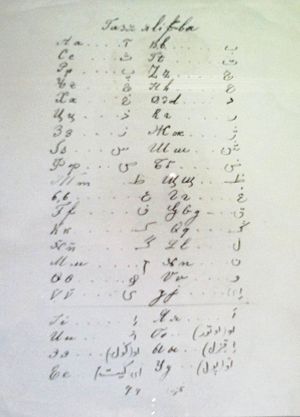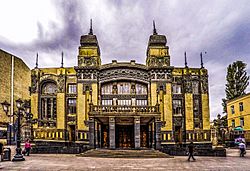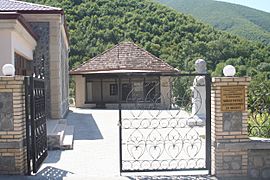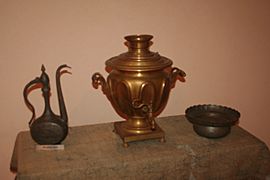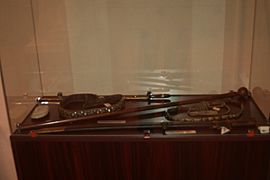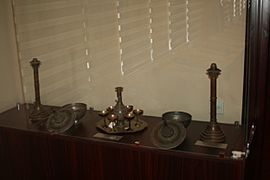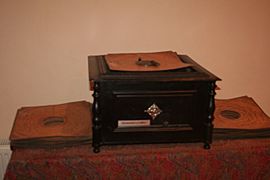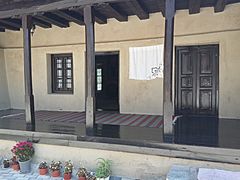Mirza Fatali Akhundov facts for kids
Quick facts for kids
Mirza Fatali Akhundov
|
|
|---|---|
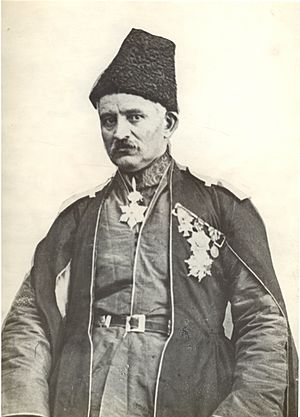 |
|
| Born | 12 July 1812 Nukha, Shaki Khanate, Qajar Iran |
| Died | 9 March 1878 (aged 65) Tiflis, Tiflis Governorate, Russian Empire |
| Occupation | Playwright, philosopher |
| Language | Azerbaijani, Persian, Russian |
Mirza Fatali Akhundov (Azerbaijani: Mirzə Fətəli Axundov; Persian: میرزا فتحعلی آخوندزاده), also known as Mirza Fatali Akhundzade, was an important writer, playwright, and thinker from the 19th century. He was born on July 12, 1812, and passed away on March 9, 1878. He is famous for writing plays inspired by European styles in the Azeri Turkic language.
Akhundov is considered the founder of modern Azerbaijani literature. He also played a key role in developing new ideas about society and government in the region. He believed that the Azerbaijani writing system should change from the old Perso-Arabic script to the Latin alphabet.
Contents
Life of Mirza Fatali Akhundov
Mirza Fatali Akhundov was born in 1812 in Nukha, which is now part of Azerbaijan. His family was wealthy and owned land. His uncle, Haji Alaskar, was his first teacher and wanted him to become a religious leader. However, young Fatali was more interested in literature and learning.
In 1832, while in Ganja, Akhundov met a poet named Mirza Shafi Vazeh. This meeting changed his path, as Vazeh introduced him to new ways of thinking from the Western world. This made Akhundov decide not to pursue a religious career.
Two years later, in 1834, Akhundov moved to Tiflis (now Tbilisi, Georgia). He spent the rest of his life there, working as a translator for the Russian Empire. He also taught at schools in Tbilisi starting in 1837. In Tiflis, he became friends with many important Russian and Armenian writers and thinkers. These friendships helped shape his modern way of looking at the world.
Early Writings and Plays
Akhundov's first published work was The Oriental Poem in 1837. He wrote it to honor the famous Russian poet Alexander Pushkin after his death. But Akhundov's main literary work began in the 1850s.
In the early 1850s, he wrote six comedies. These were the very first comedies in Azerbaijani literature and the first examples of national plays. Some of his famous comedies include Hekayati Molla Ibrahim-Khalil Kimyagar, The story of Monsieur Jourdan, a botanist and the dervish Mastalishah, a famous sorcerer, and Adventures of the Lenkaran Khanate Vizier.
Akhundov's plays were special because they bravely criticized the problems in Azerbaijan during the early 19th century. People in other countries, like Germany, praised his work. A German magazine even called him a "dramatic genius" and "the Azerbaijani Molière," comparing him to the famous French playwright.
In 1859, Akhundov published a short but well-known novel called The Deceived Stars. This novel helped start a new style of realistic historical writing in Azerbaijani literature. Through his plays and novels, Akhundov made realism the main style in Azerbaijani writing.
Ideas on Iranian Identity
Akhundov was also a strong supporter of Iranian nationalism. He believed that Iran was his homeland. He thought that Iran's past before the arrival of Islam was a time of great glory. He felt that many of Iran's problems came from later influences.
He suggested that Iranians should look back to their ancient history and culture. He even wrote letters, like Maktubàt-e Kamàl od-Dowleh beh Shàhzadeh Jamàl od-Dowleh (1860), where he shared his ideas about this glorious past. He believed that if Iran removed certain foreign influences, it could return to its former greatness. These ideas made him an important figure in the development of Iranian nationalism.
Akhundov also had unique views on religion. He was critical of many religious ideas, especially those related to Islam. However, he was very interested in the ancient Zoroastrian religion, which he saw as a true Iranian faith. He hoped it could inspire a return to what he considered Iran's original culture.
He admired people who shared his interest in ancient Iranian history, like Maneckji Limji Hataria, a Parsi scholar. Akhundov saw Parsis as a link to a "pure" Iranian past, untouched by later changes. He even said, "my appearance is that of a Turk, but I am of the Parsis' race," showing his strong connection to this ancient heritage.
Iranian Nationalism
Akhundov saw himself as part of the Iranian nation and deeply loved his Iranian homeland. He exchanged letters with Jālāl-al-Din Mirzā, a minor prince, and admired his book Nāmeh-ye Khosrovān. This book tried to tell the stories of ancient Iranian kings without using any Arabic words. It showed the pre-Islamic past as a time of great importance and saw the arrival of Islam as a big change.
Akhundov's ideas suggested that ancient Iranians and Arabs were very different groups. He believed that the pre-Islamic past held the true spirit of Iran. He thought that the Islamic period was a time of decline and blamed Iran's problems on Arabs and the adoption of Islam. He viewed the arrival of Islam as an "Arab invasion."
Mirza Aqa Khan Kermani was one of Akhundov's followers. Decades later, Kermani helped spread Akhundov's ideas, adding even more focus on racial differences. Kermani also wrote a national history of Iran, Āʾine-ye sekandari, which compared a mythical pre-Islamic past to a present that didn't meet nationalist hopes.
Alphabet Reform
Akhundov was far ahead of his time in pushing for changes to the alphabet. He realized that the Perso-Arabic script wasn't ideal for writing Turkic sounds, like those in Azerbaijani. He started working on alphabet reform in 1850.
At first, he tried to change the Perso-Arabic script to better fit the sounds of the Azerbaijani language. He wanted each sound to have its own symbol, without any repeats or missing ones. For example, the Perso-Arabic script only shows three vowel sounds, but Azerbaijani needs nine different vowel sounds.
Later, he openly suggested changing from the Perso-Arabic script to a modified Latin alphabet. The Latin script used in Azerbaijan between 1922 and 1939, and the one used today, were based on Akhundov's ideas.
Family Life
Mirza Fatali Akhundov's parents were Mirza Mahammad Taghi and Nane Khanum. In 1842, he married Tubu Khanum, who was his mother's cousin. They had 13 children, but sadly, only two of them, Nisa and Rashid, lived to adulthood.
He later married a second time to Nazli Beyim, who was a descendant of Javad Khan. With her, he had another child named Sayrabayim. He arranged for both Nisa and Sayrabayim to marry into the Bahmani family. His grandson, Fatali, was later affected by political purges in 1938.
Legacy
Beyond his important role in Azerbaijani literature and Iranian nationalism, Akhundov was also known for his strong opinions on religions, especially Islam. He remains a very famous Azerbaijani atheist.
Many places in Azerbaijan are named after Akhundov to honor him. These include the National Library of Azerbaijan, the Azerbaijan State Academic Opera and Ballet Theatre, and several streets, parks, and libraries. There is also a cultural museum in Tbilisi, Georgia, that focuses on the cultural ties between Georgia and Azerbaijan, and it is named after him.
Even a town in Armenia, called Punik, was named in his honor until recently. In 2012, an organization called TURKSOY declared that year as the "Year of Mirza Fatali Akhundzade" to celebrate his 200th birthday.
House Museum
| Mirzə Fətəli Axundovun ev muzeyi | |
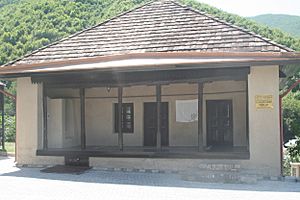
House Museum of Mirza Fatali Akhundov
July 30, 2015 |
|
| Established | 1940 |
|---|---|
| Location | |
The Mirza Fatali Akhundov's house museum is located in Sheki. It is the house where Mirza Fatali Akhundov was born and spent his childhood. This museum is special because it was the first memorial museum ever opened in Azerbaijan. It honors Akhundov as a writer, educator, poet, and a key figure in Azerbaijani drama and literary criticism.
Museum History
The house itself was built around 1800. In 1811, Akhundov's father, Mirza Mohammad Taghi, bought it. Mirza Fatali Akhundov was born here in 1812. When he was two years old, his family moved to a village near Tabriz.
Akhundov's parents divorced when he was 13. In 1825, he returned to Sheki with his family. His mother's uncle, Akhund Haji Alasgar, then took care of him. In 1833, he attended a Russian school in Sheki for a year before moving to Tbilisi in 1834. The house was turned into a museum in 1940. In 2012, for Akhundov's 200th birthday, the museum was fully renovated.
Museum Description
The house museum of Mirza Fatali Akhundov in Sheki is made up of two small rooms that connect. There is also another building nearby that was built later. This newer building has exhibits about Akhundov's life and his works.
The original house was built around 1800 using raw bricks, following the traditional Sheki architectural style. It has two rooms, a balcony, and a basement. The design, including a stove, shows its oriental style. Inside the rooms, you can see old items and antiques. In the past, the yard had stone and brick walls, an arched brick gate, and another two-story house belonging to Akhundov's cousins.
The Exposition Hall, where many exhibits are displayed, was built in 1975. After the renovations in 2011–2012, the museum now shows 248 different items related to Mirza Fatali Akhundov.
Photos
See also
- Mirza Fatali Akhundov National Library of Azerbaijan
- Mirza Fatali Akhundov State Prize of the Azerbaijan SSR


